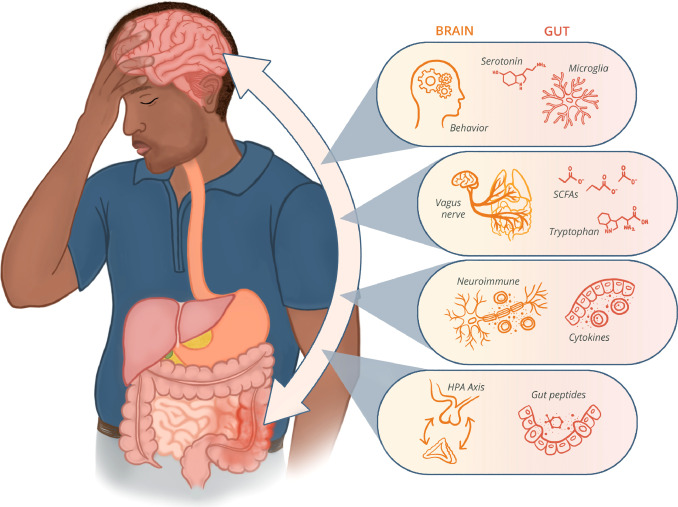The intricate relationship between our gut and brain has captivated scientists and health enthusiasts alike. This connection, often referred to as the gut-brain axis, underscores how the health of our digestive system can significantly influence our mental well-being. Understanding this link is crucial, not only for our physical health but also for our emotional and cognitive states.

"The Hidden Symphony: How Your Gut and Brain Communicate to Shape Your Health"
The intricate relationship between our gut and brain has captivated scientists and health enthusiasts alike. This connection, often referred to as the gut-brain axis, underscores how the health of our digestive system can significantly influence our mental well-being. Understanding this link is crucial, not only for our physical health but also for our emotional and cognitive states.
Understanding the Gut-Brain Axis
At its core, the gut-brain axis is a complex communication network that links the central nervous system (the brain and spinal cord) with the enteric nervous system (the vast network of neurons in the gut). This connection enables a two-way dialogue between these systems, allowing them to influence each other’s function and health.
Recent research has shown that the gut is home to a vast community of microorganisms, known collectively as the gut micro biota. These microorganisms play a pivotal role in maintaining our health by aiding digestion, producing essential vitamins, and protecting against harmful bacteria. Additionally, they produce neurotransmitters like serotonin, which is vital for mood regulation.
How the Gut Influences the Brain
One of the most fascinating aspects of the gut-brain connection is how the gut can influence brain function and behavior. The vagus nerve, a critical component of this axis, transmits signals between the gut and brain. This nerve is responsible for sending information about the state of the gut, such as its microbiota composition and gut motility, to the brain.
Moreover, the gut microbiota can affect brain chemistry by producing neurotransmitters and other neuroactive substances. For example, about 90% of the body’s serotonin, a neurotransmitter that regulates mood, is produced in the gut. Disruptions in the gut microbiota can, therefore, have significant effects on mood and behavior, potentially contributing to conditions like anxiety and depression.
The Impact of Diet on the Gut-Brain Axis
Diet plays a crucial role in shaping the gut microbiota and, consequently, the gut-brain connection. A diet rich in fiber, fruits, vegetables, and fermented foods can promote a healthy gut microbiota. These foods provide the necessary nutrients and prebiotics that support the growth of beneficial bacteria.
Conversely, diets high in sugar and saturated fats can disrupt the balance of gut microbiota, promoting the growth of harmful bacteria. This imbalance, known as dysbiosis, has been linked to various mental health disorders, including depression and anxiety. Therefore, adopting a balanced diet can help maintain a healthy gut micro biota, supporting both gut and brain health.
The Role of Probiotics and Prebiotics
Probiotics, live beneficial bacteria, and prebiotics, substances that promote the growth of beneficial bacteria, are becoming increasingly popular for their potential to enhance gut health. Probiotics can be found in foods like yogurt, kefir, and sauerkraut, while prebiotics are present in foods like garlic, onions, and bananas.
Research suggests that probiotics can help restore the balance of gut microbiota, potentially improving mood and cognitive function. Some studies have even shown that probiotics can reduce symptoms of anxiety and depression, highlighting their potential as a complementary treatment for mental health disorders.
Stress and the Gut-Brain Connection
Stress is another significant factor that affects the gut-brain axis. Chronic stress can alter the gut microbiota composition, increase gut permeability (often referred to as "leaky gut"), and heighten inflammation. These changes can disrupt the gut’s ability to communicate effectively with the brain, potentially leading to mood disorders and cognitive impairments.
Moreover, stress hormones like cortisol can affect the gut motility and function, leading to digestive issues such as irritable bowel syndrome (IBS) and other gastrointestinal disorders. Managing stress through techniques such as mindfulness, meditation, and regular physical activity can help maintain a healthy gut-brain connection.
Future Research and Implications
The field of gut-brain research is rapidly evolving, with many studies exploring the therapeutic potential of targeting the gut micro biota to treat mental health conditions. Clinical trials are underway to investigate the effects of probiotics, prebiotics, and fecal microbiota transplants on mental health, showing promising results in enhancing mood and cognitive function.
Furthermore, understanding the gut-brain connection could lead to the development of new treatments for neurological disorders such as Alzheimer’s disease and Parkinson’s disease, where gut health may play a crucial role in disease progression.
Conclusion
The gut and brain are more interconnected than we ever imagined. This dynamic relationship highlights the importance of maintaining gut health through a balanced diet, stress management, and, when necessary, probiotics and prebiotics. As research continues to uncover the complexities of the gut-brain axis, we are likely to find more ways to harness this connection for improving mental health and overall well-being. By nurturing our gut, we may not only enhance our digestive health but also boost our mood, cognition, and quality of life.